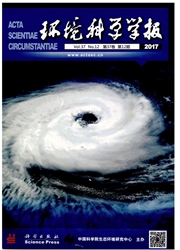

 中文摘要:
中文摘要:
以厦门市的降尘(包括一次沙尘天气)为研究对象,采用综合湿法-化学方法获得腐殖酸(HA)、干酪根+碳黑(KB)和碳黑(BC)3类大分子有机质,分析了两种天气情况下大分子有机质的形貌特征、官能团结构和来源,同时探讨沙尘天气条件下的影响.结果表明,大分子有机质的形貌特征为探讨其来源提供了丰富的信息,如呈大孔网状结构的干酪根样品可能源于植物,而呈球状结构的BC样品则可能源于煤或油的不完全燃烧.傅立叶红外光谱研究表明,降尘中的HA、KB和BC具有相似的结构组成和官能团信息,而受到沙尘天气及季节性的影响,官能团的含量存在差别.碳稳定同位素结合扫描电镜进一步研究大分子有机质来源表明,大分子有机质有明显的陆源C3植物的信息,且有部分化石燃料的信息.沙尘天气降尘中大分子有机质的δ13C值低于正常天气,这与植物的不同地域生长环境、沙尘暴携带的来自蒙古沙漠和中国西北部的沙尘及陆源有机质的δ13C值偏低区域的沙尘影响有关.KB和BC的相关性显著(r=0.964,p〈0.01),表明干酪根(K)与BC有部分相似的生物质来源.
 英文摘要:
英文摘要:
To investigate the morphological property, functional group and source of the macromolecular organic matters (MOMs) in the dusts during dust storm (DS) and non-dust storm (n-DS) periods, three MOMs, i.e. humic acid (HA), kerogen +black carbon (KB) and black carbon (BC) were extracted through a promoted comprehensive wet chemical procedure from these dust samples. The morphological properties of MOMs provided rich information for the sources, e.g. irregular macroporous network debris observed in kerogen samples might originate from vegetation, as well as the spherical BC particles might derive from coal or oil incomplete combustion. The analysis of fourier transform infrared spectroscopy (FT-IR) revealed that the MOMs had the similar functional group, but the contents of their functional groups were different from each other, which might be due to the influences of the dust storm and the seasonal variations. The results from scanning electron microscopy (SEM) combined with stable carbon isotope (δ13C) analysis showed that C3 plants were the predominant contribution, along with part contribution from fossil sources (oil or coal). In addition, the δ13C values of the MOMs in DS were obviously lower than those in n-DS, which were affected by the different growth circumstance, the dust originated from the desert in Mongolia and northwest of China during DS and the area with lower δ13C value of terrestrial organic matter. The high correlation between KB and BC (r=0.964, p〈0.01) indicated that they might have similar biomass sources.
 同期刊论文项目
同期刊论文项目
 同项目期刊论文
同项目期刊论文
 Quantification, morphology and source of humic acid, kerogen and black carbon in offshore marine sed
Quantification, morphology and source of humic acid, kerogen and black carbon in offshore marine sed Characterization of Humic Acid-like Substances Extracted from Atmospheric Falling Dust Using Py-GC-M
Characterization of Humic Acid-like Substances Extracted from Atmospheric Falling Dust Using Py-GC-M Spatial and temporal distribution of polycyclic aromatic hydrocarbons (PAHs) in the atmosphere of Xi
Spatial and temporal distribution of polycyclic aromatic hydrocarbons (PAHs) in the atmosphere of Xi 期刊信息
期刊信息
